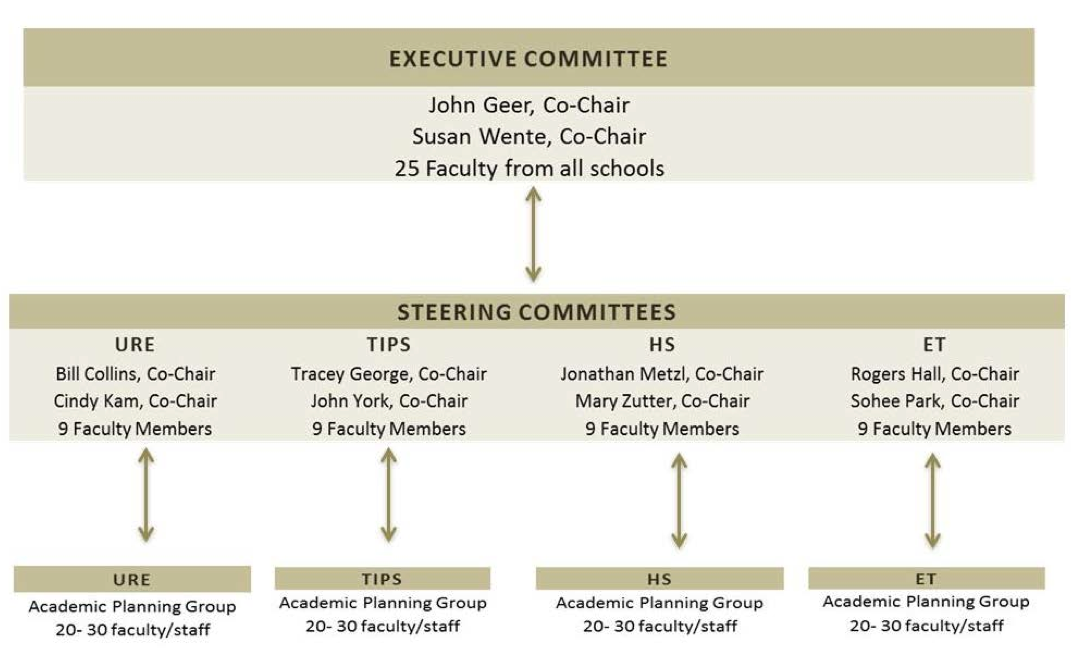Crafting the Plan
 The university's most recent strategic planning process, launched in 2013, culminated in Vanderbilt's current┬ĀAcademic Strategic Plan.┬ĀThe purpose of the 2013-14 Strategic Plan was to develop broad and compelling ideas that align with the university's mission and blaze a path for the University to follow as it approaches its 150th anniversary. At its core, the plan aspires to shape the future of higher education and make a positive difference in the world at-large.
The university's most recent strategic planning process, launched in 2013, culminated in Vanderbilt's current┬ĀAcademic Strategic Plan.┬ĀThe purpose of the 2013-14 Strategic Plan was to develop broad and compelling ideas that align with the university's mission and blaze a path for the University to follow as it approaches its 150th anniversary. At its core, the plan aspires to shape the future of higher education and make a positive difference in the world at-large.
The planning process marked the first time all ten colleges and schools were┬Āinvolved. The benefits of this inclusive, campus-wide approach┬Āwere apparent from the start, and the range of perspectives gave rise to a rich variety of innovative ideas and recommendations.
The process relied on a bottom up approach with the faculty leading the way. Over 600 faculty participated formally or informally in the process. This attribute is quite distinct in comparison to the organization of strategic plans at other universities.┬ĀAs the year unfolded, great care was also given to securing feedback from key university stakeholders. The end result allowed great ideas to flourish, and the plan benefited directly from the input of the Board of Trust, donors, alumni, students, and staff.┬Ā
With this approach, the values, visions, and initiatives that define this Strategic Plan should be positioned to not only shape the direction of the University for the coming years, but also to serve as a collective blueprint for the future.
A set of dynamic and inter-connected themes drove VanderbiltŌĆÖs 2013-14 Strategic Plan:┬ĀUndergraduate Residential Experience, Trans-institutional Programs, Healthcare Solutions, and┬ĀEducation Technologies. These overlapping themes encouraged creative exploration of new ideas that can thrive in an intimate learning environment nested within a leading research university.┬ĀThese pillars also force us to confront important challenges; whether it be the rise of new technologies, the many criticisms facing higher education, or the tough problems facing society, such as healthcare.
The Mission Statement of ├█č┐┤½├Į
├█č┐┤½├Į is a center for scholarly research, informed and creative teaching, and service to the community and society at large. Vanderbilt will uphold the highest standards and be a leader in the
- quest for new knowledge through scholarship,
- dissemination of knowledge through teaching and outreach,
- creative experimentation of ideas and concepts.
In pursuit of these goals, Vanderbilt values most highly
- Intellectual freedom that supports open inquiry,
- equality, compassion and excellence in all endeavors.
Phases of Plan Development
Concept Development Phase: June - July 2013
- Executive Committee Meetings
Concept Refinement Phase: August - October 2013
- Faculty Senate Meeting
- Executive Committee Kick-Off and Retreats in the Four Theme Areas
- Steering Committee reports submitted on October 15th
Concept Revision Phase: November 2013 - February 2014
- Board of Trust Nov and Feb Retreats
- Release of Executive Summary of POTENTIAL initiatives
- Presentations to DeanŌĆÖs Council, Faculty Senate, DAR, SOM, SOE
Continued Input and Feedback: February - May 2014
- Town Hall Meetings with Faculty
- Meetings with Student and Staff Groups
- April presentation to Board of Trust
Submitted FULL Draft of Strategic Plan to Board of Trust in June 2014
Advisory Committees
In launching this strategic planning process, Chancellor Zeppos charged the Executive Committee and its Steering Committees to be bold and creative. To meet this charge, the Planning process included for the first time the entire campusŌĆöall ten colleges and schools. This inclusive process was inspired by the success of the 2002 University Central and 2006-08 Medical Center strategic plans. The benefits of a campus-wide approach were apparent from the start, and the range of perspectives gave rise to a rich variety of innovative ideas and recommendations.┬ĀIn total, well over 1,250 colleagues and friends contributed to this process, providing constructive insights and opinions from the important constituencies that comprise Vanderbilt.┬Ā

Committees & Advisory Boards
Action & Impact Phases
Review the quarterly┬Ā Update Reports┬Āto track the plan's progress, specific to the Action and Impact phases.
